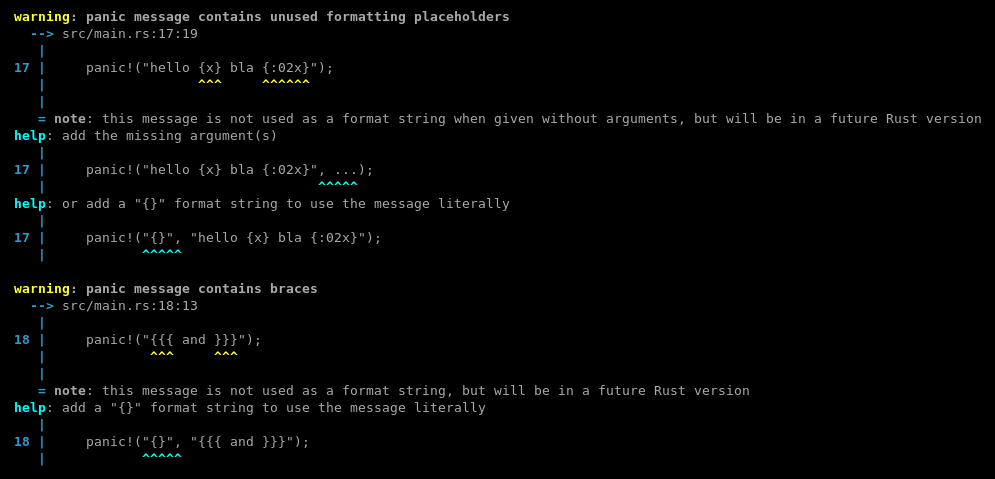Expand assert!(expr, args..) to include $crate for hygiene on 2021.
This makes `assert!(expr, args..)` properly hygienic in Rust 2021.
This is part of rust-lang/rfcs#3007, see #80162.
Before edition 2021, this was a breaking change, as `std::panic` and `core::panic` are different. In edition 2021 they will be identical, making it possible to apply proper hygiene here.
Fixes#81007
Previously, we would fail to collect tokens in the proper place when
only builtin attributes were present. As a result, we would end up with
attribute tokens in the collected `TokenStream`, leading to duplication
when we attempted to prepend the attributes from the AST node.
We now explicitly track when token collection must be performed due to
nomterminal parsing.
Before 2021, this was a breaking change, as std::panic and core::panic
are different. In edition 2021 they will be identical, making it
possible again to apply proper hygiene here.
This makes it possible to have both std::panic and core::panic as a
builtin macro, by using different builtin macro names for each.
Also removes SyntaxExtension::is_derive_copy, as the macro name (e.g.
sym::Copy) is now tracked and provides that information directly.
- Adds optional default values to const generic parameters in the AST
and HIR
- Parses these optional default values
- Adds a `const_generics_defaults` feature gate
We now collect tokens for the underlying node wrapped by `StmtKind`
instead of storing tokens directly in `Stmt`.
`LazyTokenStream` now supports capturing a trailing semicolon after it
is initially constructed. This allows us to avoid refactoring statement
parsing to wrap the parsing of the semicolon in `parse_tokens`.
Attributes on item statements
(e.g. `fn foo() { #[bar] struct MyStruct; }`) are now treated as
item attributes, not statement attributes, which is consistent with how
we handle attributes on other kinds of statements. The feature-gating
code is adjusted so that proc-macro attributes are still allowed on item
statements on stable.
Two built-in macros (`#[global_allocator]` and `#[test]`) needed to be
adjusted to support being passed `Annotatable::Stmt`.
Add lint for panic!("{}")
This adds a lint that warns about `panic!("{}")`.
`panic!(msg)` invocations with a single argument use their argument as panic payload literally, without using it as a format string. The same holds for `assert!(expr, msg)`.
This lints checks if `msg` is a string literal (after expansion), and warns in case it contained braces. It suggests to insert `"{}", ` to use the message literally, or to add arguments to use it as a format string.

This lint is also a good starting point for adding warnings about `panic!(not_a_string)` later, once [`panic_any()`](https://github.com/rust-lang/rust/pull/74622) becomes a stable alternative.
cleanup: Remove `ParseSess::injected_crate_name`
Its only remaining use is in pretty-printing where the necessary information can be easily re-computed.
The discussion seems to have resolved that this lint is a bit "noisy" in
that applying it in all places would result in a reduction in
readability.
A few of the trivial functions (like `Path::new`) are fine to leave
outside of closures.
The general rule seems to be that anything that is obviously an
allocation (`Box`, `Vec`, `vec![]`) should be in a closure, even if it
is a 0-sized allocation.
rustc_target: Further cleanup use of target options
Follow up to https://github.com/rust-lang/rust/pull/77729.
Implements items 2 and 4 from the list in https://github.com/rust-lang/rust/pull/77729#issue-500228243.
The first commit collapses uses of `target.options.foo` into `target.foo`.
The second commit renames some target options to avoid tautology:
`target.target_endian` -> `target.endian`
`target.target_c_int_width` -> `target.c_int_width`
`target.target_os` -> `target.os`
`target.target_env` -> `target.env`
`target.target_vendor` -> `target.vendor`
`target.target_family` -> `target.os_family`
`target.target_mcount` -> `target.mcount`
r? `@Mark-Simulacrum`
with an eye on merging `TargetOptions` into `Target`.
`TargetOptions` as a separate structure is mostly an implementation detail of `Target` construction, all its fields logically belong to `Target` and available from `Target` through `Deref` impls.
This allows us to avoid synthesizing tokens in `prepend_attr`, since we
have the original tokens available.
We still need to synthesize tokens when expanding `cfg_attr`,
but this is an unavoidable consequence of the syntax of `cfg_attr` -
the user does not supply the `#` and `[]` tokens that a `cfg_attr`
expands to.
Preparation for a subsequent change that replaces
rustc_target::config::Config with its wrapped Target.
On its own, this commit breaks the build. I don't like making
build-breaking commits, but in this instance I believe that it
makes review easier, as the "real" changes of this PR can be
seen much more easily.
Result of running:
find compiler/ -type f -exec sed -i -e 's/target\.target\([)\.,; ]\)/target\1/g' {} \;
find compiler/ -type f -exec sed -i -e 's/target\.target$/target/g' {} \;
find compiler/ -type f -exec sed -i -e 's/target.ptr_width/target.pointer_width/g' {} \;
./x.py fmt
Since 63793 the discriminant_value intrinsic is safe to call. Remove
unnecessary unsafe block around calls to this intrinsic in built-in
derive macros.
We currently only attach tokens when parsing a `:stmt` matcher for a
`macro_rules!` macro. Proc-macro attributes on statements are still
unstable, and need additional work.
Previous implementation used the `Parser::parse_expr` function in order
to extract the format expression. If the first comma following the
format expression was mistakenly replaced with a dot, then the next
format expression was eaten by the function, because it looked as a
syntactically valid expression, which resulted in incorrectly spanned
error messages.
The way the format expression is exctracted is changed: we first look at
the first available token in the first argument supplied to the
`format!` macro call. If it is a string literal, then it is promoted as
a format expression immediatly, otherwise we fall back to the original
`parse_expr`-related method.
This allows us to ensure that the parser won't consume too much tokens
when a typo is made.
A test has been created so that it is ensured that the issue is properly
fixed.